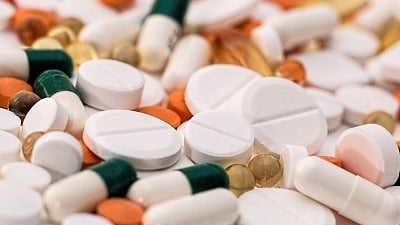New Delhi: India’s pharmaceutical industry, which has emerged as the largest supplier of affordable generic medicines, is poised to grow at 7.8 per cent year-on-year in April 2025 driven by strong demand and new products, according to experts at India Ratings.
The country’s pharma sector is now ranked 3rd in volume and 14th in value globally and contributes as much as 20 per cent of the world’s supply of medicines. The turnover of the Indian pharma industry touched Rs 4,17,345 crore in 2023-24 growing steadily at over 10 per cent annually for the past five years.
“For the common man, this means more medicines at lower prices, better healthcare and jobs in factories and labs across the country. From small towns to big cities, India’s pharma growth is creating opportunities and saving lives,” a government official said.
India has also emerged as a key supplier of vaccines. The country’s pharma sector supplies 55-60 per cent of UNICEF’s vaccines, meeting 99 per cent of WHO’s DPT (Diphtheria, Whooping cough and Tetanus) vaccine demand, 52 per cent for BCG (Bacillus Calmette-Guérin is a vaccine primarily used against TB), and 45 per cent for measles. From Africa to America, Indian vaccines save millions. At home, these schemes create jobs for young Indians, from factory workers to scientists. Foreign investors are pouring in with Rs 12,822 crore in 2023-24 alone, because they see India’s potential.
The government welcomes 100 per cent foreign investment in medical devices and greenfield pharma projects, making India a hotspot for global companies.
The government’s schemes have played a key role in promoting the pharma sector. The Pradhan Mantri Bhartiya Janaushadhi Pariyojana (PMBJP) runs 15,479 Jan Aushadhi Kendras, offering generic medicines at prices up to 80 per cent lower than branded ones. A heart medicine that once cost Rs 500 might now cost Rs 100.
The Production Linked Incentive (PLI) Scheme for Pharmaceuticals with Rs 15,000 crore, supports 55 projects to make high-end drugs like cancer and diabetes medicines right here in India. Another PLI scheme with Rs 6,940 crore focuses on raw materials like Penicillin G, reducing the country’s need for imports. The PLI for Medical Devices, backed by Rs 3,420 crore, is boosting production of tools like MRI machines and heart implants, the official added.
The Promotion of Bulk Drug Parks scheme with Rs 3,000 crore building mega hubs in Gujarat, Himachal Pradesh, and Andhra Pradesh to make medicines cheaper and faster. The Strengthening of Pharmaceuticals Industry (SPI) Scheme with Rs 500 crore, funds research and upgrades labs, helping Indian companies compete globally. These efforts mean medicines are made in India, for India and for the world keeping costs low and quality high.
(Except for the headline, this article has not been edited by FPJ’s editorial team and is auto-generated from an agency feed.)
